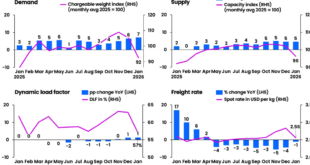Image source: Getty Images
Royal Mail owner International Distribution Services (LSE:IDS) continues to fight fires on several fronts. So despite IDS’s share price dive of the past year, the FTSE 250 firm isn’t attracting much interest from value investors, as the chart below shows.
But is the market overestimating these problems and its impact on the company’s profits? And should I buy the courier for my own shares portfolio at today’s prices?
GLS is A-OK
Weak market appetite for IDS shares reflects a stream of negative news bites at its UK-focused Royal Mail unit. But things aren’t all bad at the business.
More specifically, trading at its General Logistics Systems (GLS) division remains resolute. And as a long-term investor, I’m pretty excited about the firm’s overseas parcels unit where expansion continues.
Despite the weak global economy, revenues here increased 10.2% year on year between September and December, to £1.3bn. Sales were also up 49% from the same quarter in 2019.
Huge investment in recent years means GLS now operates in more than 40 countries across Europe and North America. I believe it’s well-placed to capitalise on booming parcel traffic that’s driven by the growth of e-commerce.
Indeed, analysts at Mordor Intelligence expect the global courier, express and parcel market to be worth $675.7bn by 2027. That would represent annual growth of 10.3% through the period.
Royal Mail is an issue
But of course buying IDS shares is also a vote of confidence in the company’s Royal Mail unit. The division accounts for almost two-thirds of group revenues.
Like most investors, I’m worried about the trading outlook here for a variety of reasons. Letter and parcel volumes are plummeting amid tough economic conditions. These fell 8% (excluding election mail) and 20% respectively in the nine months to December. And they could keep sinking as the UK economy struggles.
Royal Mail also has significant internal problems to overcome. Over the weekend, the business struck a deal in principle with the Communication Workers Union to to try and end a long-running pay dispute. But getting any agreement over the line could still be derailed by unexpected obstacles.
Any deal is also likely to result in a big spike in its staff costs. And the firm has to spend a fortune to update its sorting offices as it transitions from letters to parcels too.
Royal Mail also about to see significant regulatory penalties coming down the line. It was referred to Ofcom last month by MPs who accused the firm of “systemic letter delivery failures”.
Here’s what I’m doing now
So, on balance, I think IDS shares are best avoided. Even as a keen dip buyer I won’t touch the FTSE 250 firm with a bargepole.
Sure, the company’s share price may have fallen sharply over the past 12 months. But profit forecasts have also been slashed on account of the firm’s internal issues and challenging trading environment.
This means that IDS’s share price currently carries a huge forward price-to-earnings (P/E) ratio of 31.3 times. It’s a valuation I believe is hugely at odds with its high risk profile. And it leaves the business in danger of further share price falls.


